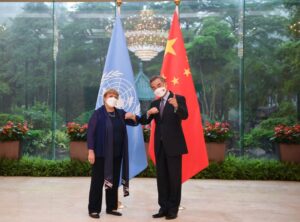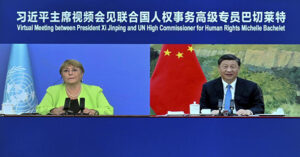
Photo: Xinhua
The visit of United Nations High Commissioner for Human Rights, Michelle Bachelet, to China on May 23 – 28 has caused great concern and deep disappointment to Tibetans and Tibet supporters, as well as human rights groups worldwide. In advance of the visit, and despite much lobbying, she was criticised as her itinerary did not include a visit to, nor any discussion of, Tibet. Her visit has been described as a “whitewash” and she is being criticised as condoning China’s actions in East Turkestan [Ch: Xinjiang], and their treatment of the ethnic minority Muslim Uyghur population there.
Bachelet’s itinerary included a visit to the province of East Turkestan where human rights organisations have accused China of detaining more than a million Uyghurs – a campaign the United States has labelled “genocide”. However, prior to her visit, the US State Department expressed doubt that the Chinese government would grant the necessary access for Bachelet to conduct a complete and unmanipulated assessment of the human rights environment in East Turkestan.
The Chinese government agreed to Bachelet’s visit on the condition it would be “friendly” and not framed as an investigation and on her arrival in China, Bachelet told an audience of mostly Beijing-based diplomats, that her tour would not be an “investigation”.
In advance of the trip, Tibet support and human rights groups warned of the potential for damage posed by the trip. The International Campaign for Tibet (ICT)* warned that Bachelet’s “friendly” visit could embolden China in its efforts to assimilate Tibetans and other non-Han groups. It could also use this visit as an excuse to reject access to future investigations, and in a press release ICT Executive Director for Germany, Kai Muller, said such trips should not take place if there is a risk the Chinese government could exploit it for propaganda purposes.
The Central Tibetan Administration issued a statement saying that while it welcomed the forthcoming visit of the United Nations High Commissioner for Human Rights to East Turkestan, it was “deeply dismayed” by the High Commissioner’s lack of response to the CTA’s appeal that she include Tibet in her visit, and that her “silence on China’s human rights abuses in Tibet is deeply concerning”.
Foreign Ministers of the G7 countries issued a communiqué saying, “We remain deeply concerned by the human rights situation in China, particularly in Xinjiang and Tibet” and added, “we urge China to fully respect human rights” and demanded that China allows “immediate, meaningful and unfettered access to Xinjiang and Tibet for independent observers, including the UN High Commissioner for Human Rights and her potential visit to China.” The Group of Seven represents the world’s seven largest “advanced” economies, Canada, France, Germany, Italy, Japan, the United Kingdom and the United States.
Fallout in the wake of the visit
 On completion of her visit, Michelle Bachelet issued a statement which has outraged Tibet supporters and human rights advocates. They are describing her visit as a “whitewash” and say she is condoning China’s actions in East Turkestan and their treatment of the ethnic minority Muslim Uyghur population there, and say they are “deeply disappointed” that she did not insist on visiting Tibet and has made only passing reference to Tibet in her statement.
On completion of her visit, Michelle Bachelet issued a statement which has outraged Tibet supporters and human rights advocates. They are describing her visit as a “whitewash” and say she is condoning China’s actions in East Turkestan and their treatment of the ethnic minority Muslim Uyghur population there, and say they are “deeply disappointed” that she did not insist on visiting Tibet and has made only passing reference to Tibet in her statement.
On Tibet, her statement says “On the Tibet Autonomous Region, it is important the linguistic, religious and cultural identity of Tibetans be protected, and that Tibetan people are allowed to participate fully and freely in decisions about their religious life and for dialogue to take place. I discussed education policies in the Tibet Autonomous Region and stressed the importance of children learning in their own language and culture in the setting of their families or communities”.
Ms Bachalet spent two days in Kashgar and Urumqi in East Turkestan where she met the Secretary of the Chinese Communist Party of the Xinjiang Uyghur Autonomous Region and the Governor and the Vice-Governor in charge of public security, among others. She visited Kashgar prison and the Kashgar Experimental School, a former Vocational Education and Training Centre (VETC) as well as meeting virtually a “number of civil society organisations working on issues relating to Xinjiang, Tibet, Hong Kong and other parts of China”. She said her visit was “informed by the work of the UN human rights mechanisms on China over many years”.
Regarding East Turkestan, she spoke of “raising questions and concerns, and admitted she was “unable to assess the full scale of the VETCs” and said the Government had assured her that the “VTEC system has been dismantled”.
She mentioned China’s “tremendous achievements” in the field of poverty alleviation and universal health care and many other general issues. She spoke of “enriching” interactions with non-government organisations. She welcomed China’s “stated aims” and “commitment” in regard to human rights and their Human Rights Action Plan of China. She went on to say that she shares “the concerns of a number of UN human rights mechanisms about laws and policies to counter terrorism and radicalism and their application.
Ms Bachalet said, “We agreed to establish regular engagement between the UN Human Rights Office and the Government of China […and] to establish a working group” which will “allow for structured engagement of my Office with China on a number of human rights issues”.
China’s state media has reported, “The Saturday statement dismissed the rampant disinformation on the Xinjiang region and was also a slap to the US and some Western countries, their media and anti-China forces.”
The International Campaign for Tibet has responded, saying the visit has given a “political victory to the Communist regime” and describing her passing comments on Tibet as “utterly unacceptable” in a statement saying, “The high commissioner’s failure to report truthfully and without fear on the human rights situation in China is a gross dereliction of her duty. Bachelet has handed the Chinese government a political victory. In failing to acknowledge the evidence showing China’s systematic human rights violations aimed at the destruction of the cultural identity and the very lives of Uyghurs and Tibetans, Mongols, and many others, the high commissioner has emboldened China and further disempowered civil society actors. Bachelet’s only two sentences on the situation in Tibet are utterly unacceptable and severely erode human rights standards and institutions.”
*The International Tibet Network is a global coalition of Tibet-related non-government organisations. Its purpose is to maximise the effectiveness of the worldwide Tibet movement.
Please see also
Call for Resignation of UN High Commissioner
UN High Commissioner’s Visit a Whitewash?
220 Rights Groups Demand UN High Commissioner Postpone China Visit




 Print
Print Email
Email